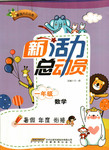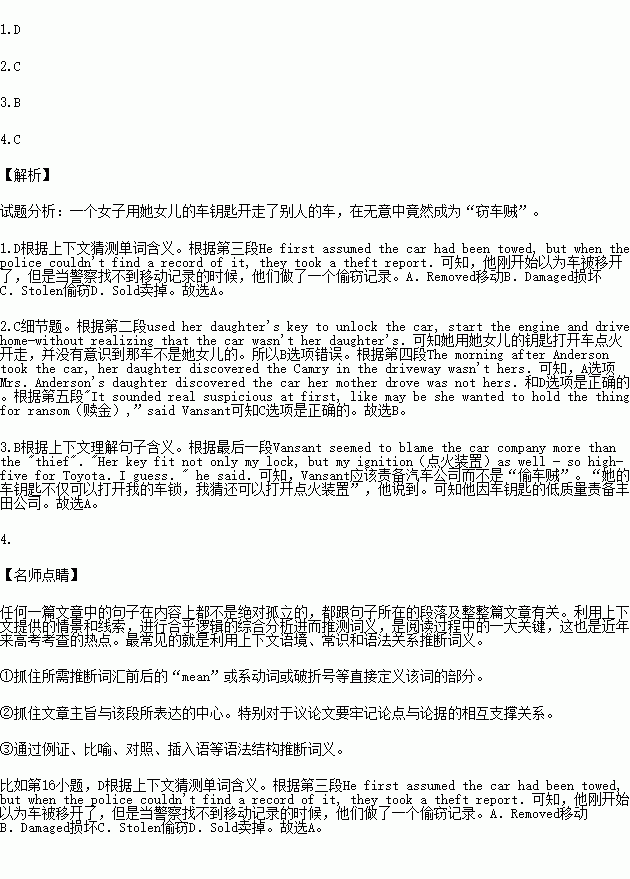题目内容
Woman Uses Daughter's Key to "Steal" Car
Charlie Vansant, a college student of Athens, Ohio, who reported that his car was stolen, got a surprise when he learned a woman had mistaken it for her daughter's car and taken it — using her key.
Kate Anderson became an accidental car thief when picking up her daughter's car near an Ohio University building last week. Anderson spotted the Toyota Camry(丰田凯美瑞)and used her daughter's key to unlock the car, start the engine and drive home — without realizing that the car wasn't her daughter's.
When Charlie Vansant left class a short time later, he found only an empty parking spot. He first assumed the car had been towed, but when the police couldn't find a record of it, they took a theft report.
The morning after Anderson took the car, her daughter discovered the Camry in the driveway wasn't hers. Anderson said she was able to find Vansant's name on paperwork in the glove compartment and look up his phone number on the website for the university.
When Anderson told Charlie the car was in her driveway, "It sounded really suspicious at first, as she wanted to hold the thing for ransom (赎金) , ” said Vansant. He eventually went to the house with a police officer, where he was reunited with his car. According to the police report, the case was closed "because of mistaken car identity", and Anderson wasn't charged.
Vansant seemed to blame the car company more than the "thief". "Her key fitted not only my lock, but my ignition(点火装置)as well — so high-five for Toyota, I guess." he said.
1. What does the underlined word "towed" mean in paragraph 3?
A. sold B. damaged.
C. stolen. D. removed
2.Which of the following is NOT true according to the passage?
A. Mrs. Anderson's daughter discovered the car her mother drove was not hers.
B. Charlie had thought he had to give Anderson money to get his car back.
C. Mrs. Anderson stole Charlie's car at the request of her daughter.
D. Mrs. Anderson used her daughter's key to unlock Charlie's car and drive home.
3. What does Charlie mean by "high-five for Toyota"?
A. He should thank Toyota for returning his car.
B. He is blaming Toyota for the poor quality of car keys.
C. He wants to celebrate with Toyota for getting his car back.
D. He thinks highly of Toyota for producing large quantities of cars.
4.What is likely to happen next according to the passage?
A. Mrs. Anderson was charged with stealing a car.
B. Charlie blamed Mrs. Anderson for mistakenly taking his car.
C. Charlie would ask the Toyota Company to give him an explanation.
D. The Toyota Company would give Charlie a new car as compensation.
 新活力总动员暑系列答案
新活力总动员暑系列答案 龙人图书快乐假期暑假作业郑州大学出版社系列答案
龙人图书快乐假期暑假作业郑州大学出版社系列答案

 United Nations Children’s Fund, American government agencies, the World Bank and soap makers Unlever and Procter and Gamble. The organizers say all soaps are equally effective at removing disease-causing germ. They say the correct way to wash is to wet your hands with a small amount of water and cover them with soap. Rub it into all areas, including under the fingernails. Rub for at least twenty seconds. Then rinse well under running water. Finally, dry your hands with a clean cloth or wave them in the air.
United Nations Children’s Fund, American government agencies, the World Bank and soap makers Unlever and Procter and Gamble. The organizers say all soaps are equally effective at removing disease-causing germ. They say the correct way to wash is to wet your hands with a small amount of water and cover them with soap. Rub it into all areas, including under the fingernails. Rub for at least twenty seconds. Then rinse well under running water. Finally, dry your hands with a clean cloth or wave them in the air.